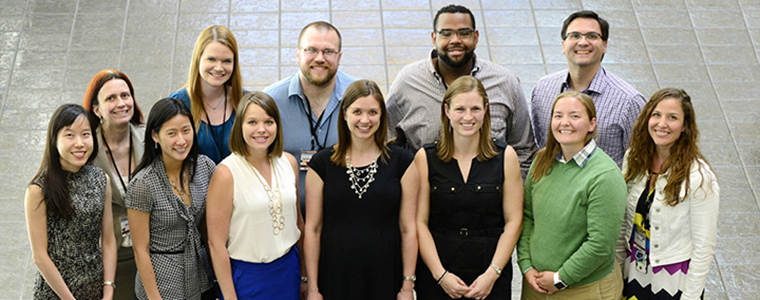Medical Students
Fellows' Career Development

Medical Students
Fellows' Career Development
The NIEHS Medical Student Research Fellowships in the NIH Intramural Research Program (IRP) provide the opportunity for third-year medical students to enhance their research skills in the resource-rich National Institutes of Health (NIH) environment through a one-year research training opportunity at NIEHS. Medical student trainees explore areas such as bioinformatics, epidemiology, immunology, cell and molecular biology, neuroscience, developmental biology, structural biology, signal transduction and clinical research. Interested students should email the Program Director, Program Director, Michael B. Fessler, M.D., with inquiries about potential projects and mentors. Fellowships will begin in late summer/early fall.
Resources for Prospective Medical Students
Program Requirements | Housing | Stipend/Salary
(Source: NIEHS Medical Student Research Fellowships)
Program Requirements
Eligibility: Interested full-time medical students pursuing an M.D. or M.D./Ph.D. may apply. Only students who are enrolled full time and in good standing at their institution are eligible. Typically, most applicants apply during the winter of their second year, with the intention of spending the third year in this fellowship. Nonclinical trainees, such as Ph.D. candidates, part-time participants, or those interested in less than a full-year commitment are not eligible.
Background Check: Please note any fellowship offer is contingent on your ability to successfully pass a federal background check, which is required for logical and physical access to NIH facilities and systems. As part of the clearance process, you will be asked “In the last year, have you used, possessed, supplied, or manufactured illegal drugs?” This question pertains to the use of controlled substances or drugs as defined under federal law. Please be aware that while marijuana may be legal or decriminalized within your home jurisdiction it remains illegal under U.S. federal law. The use, possession, supply, or manufacture of marijuana may preclude you from obtaining the necessary clearances to participate in NIH intramural training programs, even if you were initially offered a position. If you have questions about this policy or would like guidance on the clearance process, please reach out to the Office of Intramural Training & Education (please put eligibility inquiry in the subject line).
Application Procedure: First, review the specific research fields, publications, and other details provided on the webpage of each principal investigator. The investigator webpages can be accessed through the branch and laboratory links. Once you identify an investigator whose research field is of interest to you, contact them by telephone or email, and discuss potential projects that are of mutual interest. You may also email the Program Director, Michael B. Fessler, M.D. to discuss your interests and appropriate mentors.
The investigators will provide guidance on what research projects can likely be accomplished within a twelve-month period. Together, you and the principal investigator will devise a suitable project outline, hypothesis, and goals. Although any research project theme is suitable, preference will be given to projects that will study a biological system in which external factors are to be applied experimentally, in order to perturb the system and understand its responses. Any experimental organism can be studied, but preference will be given to projects that have relevance to human biology and health.
During these discussions, the principal investigator will also be interviewing you to determine if they are interested in accepting you into their research group.
If the investigator is interested, download and fill out an Download Fellow's Application Form (196KB)(214KB)(214KB), and submit it by email as soon as possible. Letters of reference and a project description are also required. The principal investigator who has agreed to be your mentor for the project must submit a recommendation letter to the program administrator Mercedes Arana, Ph.D. and Michael B. Fessler, M.D. that justifies your selection and details their plans for your success.
Your official transcript is not required prior to submitting your application. However, if chosen for a fellowship, the award can only be activated upon receipt of the transcript.
Applications lacking complete forms, or lacking the NIEHS mentor letter and required reference letters will not be accepted.
Housing
Most NIEHS intramural research takes place at our main campus at 111 T.W. Alexander Drive in Research Triangle Park, North Carolina. If the mentor is located at the NIH main campus, the research will take place at 9000 Rockville Pike, Bethesda, Maryland.
NIEHS is located between Raleigh and Durham in the Research Triangle Park. Public transportation is limited to the services provided by RTP Connect, which subsidizes up to $10 per Uber or Lyft trip to get from the Regional Transit Center in RTP to NIEHS. As a government agency, we cannot endorse specific housing arrangements or advise on where to live. However, we have put together a guide about moving to the RTP area for informational purposes only.
Moving to RTP
Here you will find a 9-page guide containing a wealth of information about living in and moving to the Research Triangle Region of North Carolina.
Stipend
Predoctoral (Graduate Student) IRTA and Visiting Fellow Stipend Levels - effective May 1, 2023
| Postbaccalaureate Education or Training Completed Upon Activation of Award* | Initial Stipend | Second Year | Third Year | Fourth Year | Fifth Year |
|---|---|---|---|---|---|
| 0-1 year | $46,100 | $55,400 | $57,300 | $59,300 | $59,300 |
| 1-2 years | $48,300 | $55,400 | $57,300 | $59,300 | $59,300 |
| 2-3 years | $50,400 | $55,400 | $57,300 | $59,300 | $59,300 |
| > 3 years | $50,400 | $55,400 | $57,300 | $59,300 | $59,300 |
STIPENDS NTE $59,300
* Postbaccalaureate education or training completed upon activation of award can include relevant full-time/equivalent postbaccalaureate research experiences, professional, medical, and graduate school enrollment. If someone has, e.g., 1 year plus 3 months of education or training, he/she should receive the 1-2 year stipend.
Resources for Current Medical Students
This handbook has important information about the program. Note: some of the information in this handbook is specific to trainees located at the main NIH campus in Bethesda, Maryland.
NIH Medical Research Scholars Program:
Medical students at NIEHS have the opportunity to participate in programming with the NIH Medical Research Scholars Program including lectures, journal clubs, networking sessions and workshops. NIEHS students attend programming virtually, and make several trips to the Bethesda campus to interact with Medical Scholars colleagues located there.
Office of Fellows’ Career Development (OFCD):
OFCD staff are located at NIEHS and offer programming and training for NIEHS medical students. We typically have new fellow orientation the first Thursday of every month, be on the lookout for information in your email. OFCD can help you with career planning and any NIEHS- specific questions that may come up. The director of the OFCD is Mercedes Arana, Ph.D.
Office of Intramural Training and Education (OITE):
OITE staff are mostly located in the Bethesda, Maryland area but travel to NIEHS often and offer videocasts and webinars of their programming. In addition, OITE provides an on-site career counselor to NIEHS twice per month.
The NIEHS Trainees Assembly (NTA) is an organization coordinated and governed by NIEHS scientists-in-training and was created through the support of the NIEHS Office of the Scientific Director in order to foster the professional development of NIEHS trainees. The membership is comprised of all non-tenured/non-tenure track, non-permanent scientists training at the institute. Due to the variety of scientists in training at NIEHS and the broad range of training needs, the NTA organizes and sponsors a variety of activities.
Annual NIEHS Biomedical Career Symposium:
The NIEHS Career Symposium is one of the largest assemblies of biomedical organizations and young scientists in Research Triangle Park, North Carolina. Targeting postdoctoral fellows and graduate students, the Career Symposium provides young scientists with an opportunity to explore a myriad of career options and create a contact network as they plan for their future careers in the biomedical sciences. The symposium features workshops and career panels that showcase the wide variety of career path options available to current and prospective PhD-holders. The event also features up to 100 CV/resume review sessions, along with time for networking with company representatives in the afternoon.
Program Participants
2019-2020
Michael Hu
Chronic Disease Epidemiology Group
Risk Factors for Chronic Disease
Mentor: Dale Sander, Ph.D.
2018-2019

Anne Kim
Reproductive Physiology and Pathophysiology Group
Neuroendocrinology of Reproduction and Aging
Mentor: Janet Hall, M.D., M.S.
Chizoba Umesi
Social and Environmental Determinants of Health Equity Group
Impact of Environment on Disparities
Mentor: Chandra Jackson, Ph.D., M.S.
2017-2018
Bob Sun
Pediatric Neuroendocrinology Group
Genetic and Environmental Determinants of Pubertal Development
Mentor: Natalie Shaw, M.D., MMSc.
Christian Hyacinthe
Environmental Genetics Group
Genetic Susceptibility in Lung Disease
Mentor: Steve Kleeberger, Ph.D.
2016-2017
Teminioluwa Ajayi
Clinical Investigation of Host Defense Group
Innate Immune Response
Mentor: Michael Fessler, M.D.





